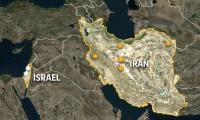India and hate
The terrible gang rape of a college student on a public bus in the Indian capital might end up havin
By Ahmed Quraishi
January 03, 2013
The terrible gang rape of a college student on a public bus in the Indian capital might end up having an impact beyond the country’s borders. Although an internal matter, this particular incident concerns India’s neighbours like Pakistanis, Sri Lanka, China, Bangladesh and Nepal.
India is a country beset by virulent hatreds of all types: political, historical, religious and social. These hatreds are so potent that they led to the 21st century’s first genocide. More than 2,000 Indians were butchered and burned across Gujarat, a major trading state in western India near the Pakistani border.
The murder of 2,000 Indians spread over just three days was no small matter, taking place as it did in the 21st century, and not in the 20th or 19th centuries. The fact that almost all those who were killed were Indian Muslims; men, women, elderly and children – eliminated on the streets by mobs representing the majority religious group, meant that this was a ghastly incident of ethnic cleansing and religious extermination.
In less than seventy years, since the creation of India in 1947, New Delhi managed to provoke a war and several border clashes with China, four wars with Pakistan, invade Bangladesh, fight a proxy war in Sri Lanka and indirectly interfere in Nepal.
The Indian military invasion in 1971 of what is now Bangladesh is a good example of how the combustible mix of hate motivated by history and religion poisoned India’s foreign policy.
In 1971, there was no armed freedom movement in Kashmir. There were no pro-Kashmir groups like Lashkar-e-Taiba (LeT). In that year, Pakistanis were busy in messy and chaotic elections. Less than 40,000 Pakistani soldiers were stationed in East Pakistan, mostly in their barracks and posing no threat to India.
Despite this peaceful Pakistani posture, the Indian army crossed international borders in December of that year in an unprovoked war of opportunity.
Several indisputable evidences that emerged in the following years show how India meticulously planned the invasion at least two years in advance, if not more, recruiting agents and saboteurs and deploying a psy-ops strategy.
Until 1971, Kashmir was the only dispute between Pakistan and India and was contested in a largely peaceful manner inside the UN Security Council. But India created a permanent blood feud with Pakistan by planning and executing the one-sided, unprovoked invasion.
India’s domestic and foreign policies appear to be entrenched in the cultural ethos of the Hindi-speaking belt of northern India. The Hindi-speaking minority enjoys disproportionate control over the country and deciding its policies. These policies were responsible for wars with neighbours, for prolonging the Kashmir conflict, and for feeding hate against India’s Christian, Sikh, Muslim, Dalit and Assamese minorities.
Modern India needs to be peaceful from within and without, and this is in the interest of all of India’s neighbours. There is something wrong in India and its opinion leaders need to end the state of denial. There have been many recent warnings. The 2002 Gujarat ethnic cleansing is one. There are riots against poor Assamese migrant workers. The Indian interior ministry blamed those riots on alleged Facebook posts originating in Pakistan. The ridiculous accusation caused embarrassment to India as television footage showed ordinary Indians beat and humiliate the Assamese workers on the streets prompting a mass exodus by the Assamese from Indian cities back to Assam.
We in Pakistan continue to be at the receiving end of hate originating from India. In 2007, a group of Pakistani families were blown up aboard a ‘friendship train’ travelling from Pakistan to New Delhi. Recently, Pakistani artists, businessmen and sportsmen visiting India complained of harassment by local extremists.
On Twitter, Pakistanis increasingly complain about Indian trolls who dedicate time and human resource to spam Pakistani news threads.
The protests by the Indian civil society show there is hope that India will be able to defeat the multifaceted hatreds that pollute Indian society and politics.
Email: aq@projectpakistan21.org
India is a country beset by virulent hatreds of all types: political, historical, religious and social. These hatreds are so potent that they led to the 21st century’s first genocide. More than 2,000 Indians were butchered and burned across Gujarat, a major trading state in western India near the Pakistani border.
The murder of 2,000 Indians spread over just three days was no small matter, taking place as it did in the 21st century, and not in the 20th or 19th centuries. The fact that almost all those who were killed were Indian Muslims; men, women, elderly and children – eliminated on the streets by mobs representing the majority religious group, meant that this was a ghastly incident of ethnic cleansing and religious extermination.
In less than seventy years, since the creation of India in 1947, New Delhi managed to provoke a war and several border clashes with China, four wars with Pakistan, invade Bangladesh, fight a proxy war in Sri Lanka and indirectly interfere in Nepal.
The Indian military invasion in 1971 of what is now Bangladesh is a good example of how the combustible mix of hate motivated by history and religion poisoned India’s foreign policy.
In 1971, there was no armed freedom movement in Kashmir. There were no pro-Kashmir groups like Lashkar-e-Taiba (LeT). In that year, Pakistanis were busy in messy and chaotic elections. Less than 40,000 Pakistani soldiers were stationed in East Pakistan, mostly in their barracks and posing no threat to India.
Despite this peaceful Pakistani posture, the Indian army crossed international borders in December of that year in an unprovoked war of opportunity.
Several indisputable evidences that emerged in the following years show how India meticulously planned the invasion at least two years in advance, if not more, recruiting agents and saboteurs and deploying a psy-ops strategy.
Until 1971, Kashmir was the only dispute between Pakistan and India and was contested in a largely peaceful manner inside the UN Security Council. But India created a permanent blood feud with Pakistan by planning and executing the one-sided, unprovoked invasion.
India’s domestic and foreign policies appear to be entrenched in the cultural ethos of the Hindi-speaking belt of northern India. The Hindi-speaking minority enjoys disproportionate control over the country and deciding its policies. These policies were responsible for wars with neighbours, for prolonging the Kashmir conflict, and for feeding hate against India’s Christian, Sikh, Muslim, Dalit and Assamese minorities.
Modern India needs to be peaceful from within and without, and this is in the interest of all of India’s neighbours. There is something wrong in India and its opinion leaders need to end the state of denial. There have been many recent warnings. The 2002 Gujarat ethnic cleansing is one. There are riots against poor Assamese migrant workers. The Indian interior ministry blamed those riots on alleged Facebook posts originating in Pakistan. The ridiculous accusation caused embarrassment to India as television footage showed ordinary Indians beat and humiliate the Assamese workers on the streets prompting a mass exodus by the Assamese from Indian cities back to Assam.
We in Pakistan continue to be at the receiving end of hate originating from India. In 2007, a group of Pakistani families were blown up aboard a ‘friendship train’ travelling from Pakistan to New Delhi. Recently, Pakistani artists, businessmen and sportsmen visiting India complained of harassment by local extremists.
On Twitter, Pakistanis increasingly complain about Indian trolls who dedicate time and human resource to spam Pakistani news threads.
The protests by the Indian civil society show there is hope that India will be able to defeat the multifaceted hatreds that pollute Indian society and politics.
Email: aq@projectpakistan21.org
-
 Nvidia’s New Specialized Chip Aims To Accelerate AI Processing Speeds
Nvidia’s New Specialized Chip Aims To Accelerate AI Processing Speeds -
 Demi Moore Was Left With ‘intense’ Illness After ‘The Substance’
Demi Moore Was Left With ‘intense’ Illness After ‘The Substance’ -
 How AI Can Read Your Thoughts Without You Speaking?
How AI Can Read Your Thoughts Without You Speaking? -
 Elon Musk’s Grok Faces Scrutiny From Federal Agencies Amid Pentagon-Anthropic Standoff–Here’s Why
Elon Musk’s Grok Faces Scrutiny From Federal Agencies Amid Pentagon-Anthropic Standoff–Here’s Why -
 ‘I Saw Nothing’: Bill Clinton Denies Knowledge Of Epstein’s Crimes In House Testimony
‘I Saw Nothing’: Bill Clinton Denies Knowledge Of Epstein’s Crimes In House Testimony -
 Jim Carrey Makes Surprising Confession About Rarely Seen Girlfriend Min Ah
Jim Carrey Makes Surprising Confession About Rarely Seen Girlfriend Min Ah -
 How Michael J. Fox Helped Harrison Ford With His Parkinson's Monologue
How Michael J. Fox Helped Harrison Ford With His Parkinson's Monologue -
 AI Safety Battle: Anthropic Fires Back At Pentagon After US Military Flags It ‘supply Chain Risk’
AI Safety Battle: Anthropic Fires Back At Pentagon After US Military Flags It ‘supply Chain Risk’ -
 OKC Vs Nuggets: NBA MVP Shai Gilgeous-Alexander Scores 36 In Fiery Overtime Win
OKC Vs Nuggets: NBA MVP Shai Gilgeous-Alexander Scores 36 In Fiery Overtime Win -
 Eric Dane's Biggest Regret Comes To Light Following Days Of His Death
Eric Dane's Biggest Regret Comes To Light Following Days Of His Death -
 Israel Launches Attack On Iran's Capital And Declares State Of Emergency
Israel Launches Attack On Iran's Capital And Declares State Of Emergency -
 At Least 15 Dead After Military Plane Carrying New Banknotes Plunges Out Of Control In Bolivia
At Least 15 Dead After Military Plane Carrying New Banknotes Plunges Out Of Control In Bolivia -
 OpenAI Partners With Pentagon After Trump Bans Anthropic AI
OpenAI Partners With Pentagon After Trump Bans Anthropic AI -
 Trump Orders Federal Agencies To Stop Using Anthropic AI Tools
Trump Orders Federal Agencies To Stop Using Anthropic AI Tools -
 Shocking Details Emerge In Martin Short’s Daughter Katherine's Death Investigation: 'Kept To Herself'
Shocking Details Emerge In Martin Short’s Daughter Katherine's Death Investigation: 'Kept To Herself' -
 Daniel Serafini Gets Life Without Parole In In-laws Murder And Attempted Murder Case
Daniel Serafini Gets Life Without Parole In In-laws Murder And Attempted Murder Case



